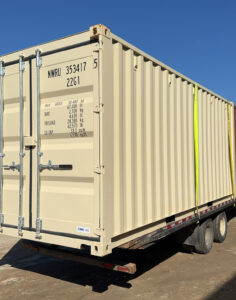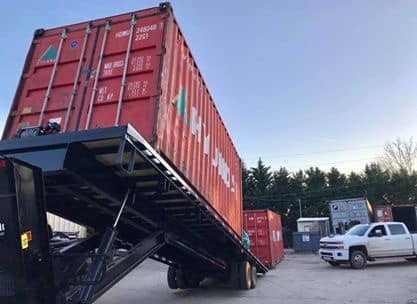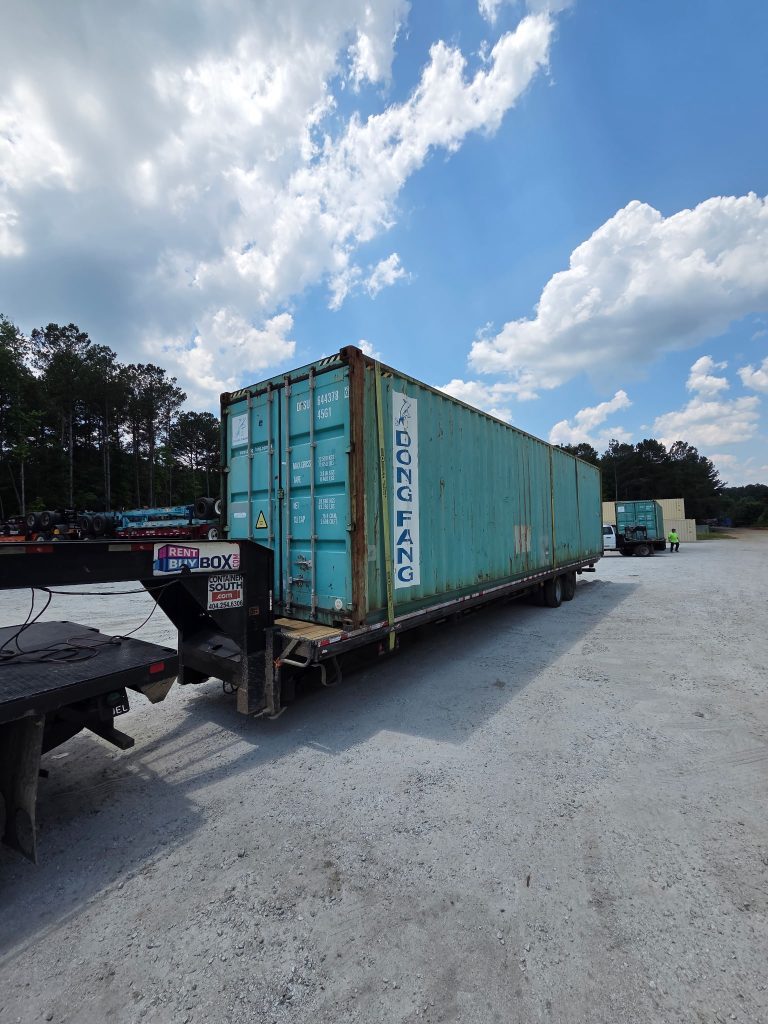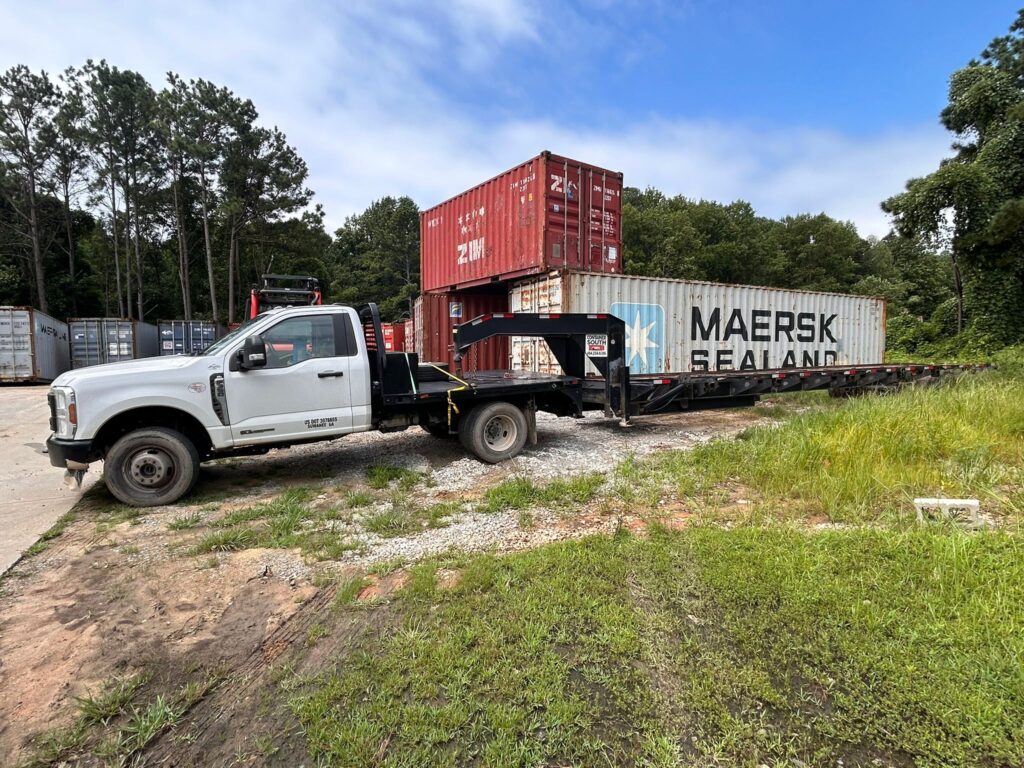Here are some facts about shipping containers:
The global economy is dependent on shipping containers for the transportation of all types of inventory. These shipping containers often travel by sea to get physical goods from one location to another for the most affordable amount of dollars per dollar. We rarely think about how a product gets from a warehouse to our home, but most of the time, the inventory is transported in a cargo box (especially when a product is built in China and sent to the United States). Learning some important facts about shipping containers helps us understand just how vital they are to global trade.

Cargo boxes are also known as shipping containers, conex boxes, and portable storage units. They are mostly used in the transportation of inventory across land and sea. Shipping containers vary in size; however, the most standard sizes of storage containers are 8ft by 20ft and 8ft by 40ft, with a height of 8’6″.
Another standard size cargo box is referred to as high cube containers, which are also available in the 8′ X 20′ and 8′ X 40′ sizes; however, these high cube containers have a height of 9’6“. High cube containers are a better solution for those looking for a more spacious storage unit.
Most shipping containers that have been in production over the last 20 years are built of high-quality 14-gauge steel. They generally have plywood flooring with the ability to lock the containers with a key and master lock or other type of heavy-duty industrial lock. They can also be stacked vertically with a secure 4-point rod system. Discovering important facts about shipping containers helps explain why they’re the backbone of global trade.
Some Fun Facts About Shipping Containers
Based on current statistics, nearly half of all shipping containers currently in use are owned by commercial shipping companies. The other half is not owned by any particular person and is rented out on a per-trip basis. When well-maintained with regular maintenance, shipping containers can last well over 20 years.
The majority of cargo boxes are only used for transportation for 10 – 15 years before they are resold as a long-term stationary storage solution. Every year, thousands of cargo boxes find a new home at the bottom of the ocean floor after they are lost at sea, falling off the ships that carry them (We are pretty sure Ariel is happy with her new inventory). Current figures state that anywhere from 2 thousand to 10 thousand.
A thousand shipping containers are lost every year. Currently, the Global Container Fleet has close to 170 million of these shipping containers in their commercial inventory. Every year, over $230 billion is spent on new vessels for the global shipping industry in an effort to increase overall container transportation.
Nearly 95% of the world’s physical cargo is transported by ship every year. Only 3% of all cargo boxes are produced outside of China. A standard 8ft X 20ft shipping container can weigh 2,180 kg, or 5,030 lbs, and can carry a payload of 28,300 kg, or 62,390 lbs. Standard 8ft X 40ft cargo boxes can weigh up to 3,640 kg, or 8,024 lbs. These 40 standard shipping containers can transport a payload capacity of 28,800 kg, or 63,625 lbs. A 40′ high cube shipping container can weigh 3,810 kgs, or 8,400 lbs, and can carry a payload capacity of 28,690 kgs, or 63,250 lbs.

Fascinating Facts About Shipping Containers You Didn’t Know
The way things are transported around the world has been revolutionized by shipping containers. They are more than just steel boxes, as evidenced by their development in the middle of the 20th century and their current uses. In this section, Container South will reveal some facts about shipping containers and examine their background, advantages, and inventive applications. Some fascinating facts about shipping containers show how they keep the world moving every day.

A Brief History of Shipping Containers
Global trade was revolutionized in the 1950s when Malcolm McLean created the idea of shipping containers. Cargo loading and unloading were expensive and time-consuming prior to their use. The standardized container system expedited shipping times, decreased theft, and decreased prices. You can examine more closely the history of shipping containers worldwide by using information from the World Shipping Council
Why Are Shipping Containers Important?
How shipping containers influenced globalization is among the most important facts about them. Transport container standardization reduced shipping expenses. Mass trade between continents was made possible, and supply chain efficiency rose. Guidelines are provided by the International Maritime Organization (IMO) to guarantee shipping containers continue to be dependable and safe everywhere. Find out more at IMO.org
Environmental Impact and Sustainability
Contemporary shipping containers support sustainability initiatives as well. Many old containers are repurposed into eco-friendly residences and green workplace spaces instead of being thrown away. By reusing makeshift classrooms, carbon emissions and steel waste are decreased. Recycling steel has a much smaller environmental impact than producing new materials, claims EPA.gov
Creative Uses of Shipping Containers
Beyond logistics and commerce, shipping containers have found numerous unique uses, such as:
– Container homes: Low-cost housing options across the globe.
– Pop-up stores: Fashionable urban retail areas
– Disaster relief shelters: Fast, reliable emergency shelters.
These additional uses emphasize the versatility and adaptability of shipping containers.

Safety and Regulations
Strict safety regulations are followed in the construction of shipping containers. Their resilience to severe weather conditions, strength, and durability are evaluated. To ensure quality and safety worldwide, organizations such as the International Organization for Standardization establish container norms. Uncover key facts about shipping containers that explain how strict safety rules keep them reliable worldwide.
Fun Facts About Shipping Containers
-
The longest voyage of a container ship can last over 30 days.
-
Some containers have tracking devices for real-time location updates.
-
The largest container ships can carry over 24,000 containers at once.
-
Old containers are being turned into luxury hotels and swimming pools.
Conclusion
As we have shown, there are many interesting facts about shipping containers. They changed international trade and resurrected the creative and sustainable industries. The world economy still depends heavily on shipping containers because of their remarkable resilience, dependability, and inventive repurposing. Their narrative serves as an example of how logistical innovation may have enduring effects on our construction, employment, and way of life. You can get inspired by creative ideas and fun facts about shipping containers from around the globe.


